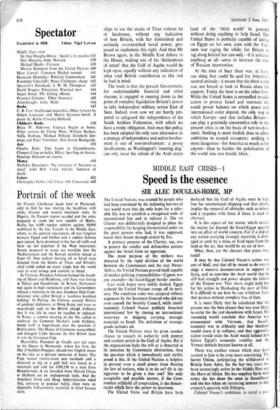Portrait of the week Sir Francis Chichester made land in
Plymouth, only to find he was sharing the headlines with crisis, disaster and several imminent wars. In Nigeria, the Eastern region seceded and the army prepared to crush the new republic of Biafra. Biafra has 4,000 regular soldiers against 10,000 mobilised by the foe. Tumult in the Middle East, where, to the general amazement, all was forgiven between Egypt and Jordan and a sudden defence pact signed. Syria promised to fire her oil wells and blow up her pipelines if the West intervened, Russia prepared to move ten warships into the Mediterranean and the Kuwait pavilion closed at Expo 67. Two tankers bearing oil to Israel were diverted from the Straits of Tiran, and Britain's chief rabbi called on every single Jew the world over to send money and comfort to Israel.
In Vietnam, President Johnson banned the bomb- ing of Hanoi and Haiphong. and there was rioting in Tokyo and Guadeloupe. In Britain, Parliament met again in high excitement and the Government refused a welcome to the new Zambian High Com- missioner who carted Britain a 'toothless humbled bulldog.' In Peking. the Chinese accused Britain of gunboat diplomacy in Hong Kong and were so exceedingly rude to the British chat* d'affaires that it was felt he must be recalled or replaced. In Rome. a summit meeting of the Six, called to celebrate the Common Market's tenth birthday, found itself at loggerheads over the question of British entry. The House of Commons reassembled. and Glasgow Celtic became the first British team to win the European Cup.
Meanwhile, President de Gaulle sent red roses to the Queen in Normandy, where her host, the Due d'Audifert-Pasquier, placed two English swans on his lake as a delicate memento of home. The Pope named twenty-seven new cardinals and a diamond as big as a golf ball was found in a mountain and sold for £108,180 to a man from Bloemfontein. A rat travelled from Oxford Circus to Holborn on an underground train. And the American Food and Drug Administration ruled that, contrary to popular belief, there were no detectable hallucinatory materials in dried banana skins.


































 Previous page
Previous page